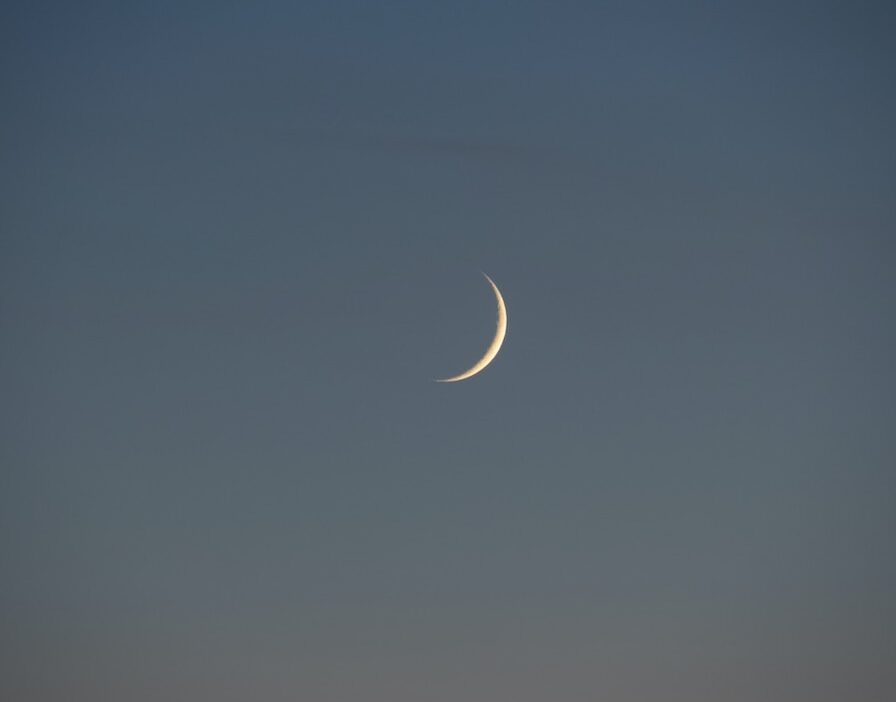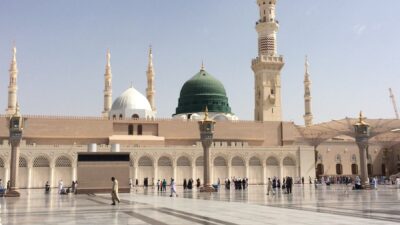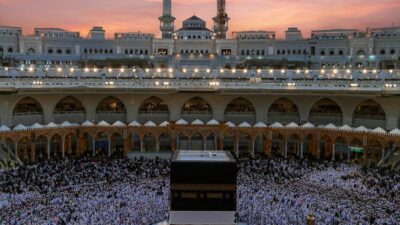In part two of this series we highlighted some instances of ‘Umar’s opinion coinciding with the Holy Qur’an. In third part of our series on ‘Umar, (radi ullahu anhu), we highlight some of virtues and his amazing insight.
People were afraid of him and so was the Shaytan
Sa‘d ibn Abi Waqqas said: ‘Umar ibn al-Khattab sought permission to see the Messenger of Allah. There were some women of Quraysh with him who were talking to him. They were asking too many questions, raising their voices above his . When ‘Umar ibn al-Khattab asked for permission to enter, they ran and hid. The Messenger of Allah gave him permission to enter, so ‘Umar came in and found the Messenger of Allah smiling. He said, “May Allah make you smile always. O’ Messenger of Allah.” The Prophet said, “I am surprised about these women who were with me. When they heard your voice, they ran and hid. ” ‘Umar said, “You have more right to be feared by them. O’ Messenger of Allah.” Then ‘Umar said, “O’ enemies of yourselves! Do you fear me and not the Messenger of Allah?” They said, “Yes, you are more harsh and more stern than the Messenger of Allah.” The Messenger of Allah said, “O’ son of al-Khattab, by the One in Whose hand is my soul, the Shaytan never meets you on a path but he takes another path“. (Bukhari)
“You are just a stone; you do not cause harm or bring benefit”
It was narrated from ‘Abis ibn Rabee‘ah that ‘Umar came to the Black Stone and kissed it, then he said: “I know that you are just a stone; you do not cause harm or bring benefit. If I had not seen the Prophet kiss you, I would not have kissed you.”
At-Tabari said: “ ‘Umar only said that because the people had only recently given up idol worship. He was afraid that the ignorant might think that acknowledging the stone was a kind of veneration of stones, which is what the Arabs used to do during the Jaahiliyah. ‘Umar wanted it to be known that acknowledging the stone was following the action of the Prophet .”
Then Ibn Hajar said: “These words of ‘Umar represent submission to the Lawgiver in matters of religion, and following (the Sunnah) in the proper manner where the reason is not explained. This is an important principle in following the Prophet in matters where one does not know the wisdom behind it.” This attitude — following the Sunnah and being eager to do so — is one of the factors in the success of the Sahabah. They knew that it was essential to follow the Sunnah so that Allah would grant them help and support.
Cutting down the tree of al-Ridwan
Ibn Sa‘d narrated with a saheeh isnad from Nafi‘ that ‘Umar heard that some people were going to the tree of ar-Ridwan and praying there. He warned them, then he ordered that it be cut down, and it was cut down. This was ‘Umar’s attitude in defending Tawheed and eradicating the causes of fitnah when those Tabi ‘een did something that the Sahabah had never done. This was an innovation, which may have led to them worshipping that tree later on, so he ordered that it be cut down.
The grave of Prophet Daniel (alaihi salaam)
The scholars of history have stated that Daniyal was one of the Israelite Prophets. He lived at the time of Nebuchadnezzar, who destroyed Bayt al-Maqdis , killed many of the Children of Israel, and burned the Torah. They said that he foretold the coming of our Prophet Muhammad . Shaykh al-Islam Ibn Taymiyah said: “Daniyal mentioned Muhammad the Messenger of Allah by name and said: “Arrows will be departing from bows and arrows will be stained with blood at your command, O Muhammad.”
When the grave of Prophet Daniel was discovered in Tastar, Abu Moosa wrote to ‘Umar ibn al-Khattab about it. ‘Umar wrote back, telling him: “Dig up thirteen graves during the day, then bury him in one of them during the night and raze his grave, lest the people be tempted or confused by that.”
The wisdom and motive behind ‘Umar’s action were the following three hadeeth:
- He (sallallahu alaihi wa-sallam) also said: “The most evil of mankind are those who will be alive when the Last Day arrives and those who take graves as places of worship.” Musnad Ahmad Ibn Ḥanbal
- Beware that those before you took the graves of their Prophets as places of worship. Do not take graves as places of worship, for verily I forbid you to do so.”[Muslim]
- As Allah’s Messenger (sallallahu alaihi wa-sallam) was about to breathe his last, he drew his sheet upon his face and when he felt uneasy, he uncovered his face and said in this very state: “May Allah’s curse be upon the Jews and Christians for taking the graves of their Prophets as places of worship.” (Bukhari). So the Prophet salalahu aliahi wa sallam was suffering the pangs of death; he was in a state of distress and difficulty, but he was a mercy to mankind. Despite his situation, he was extremely concerned for the Ummah. He feared that his grave would be taken as a place of worship, and he cursed the Jews and Christians for taking the graves of their Prophets as places of worship.
Dealing with people who spread doubts about the religion
Clear and Ambigious Verses
Even though innovation hadn’t raised its ugly head in the time of ‘Umar bin al-Khattab, he was well aware of the dangers of pursuing the unclear verses.
"It is He Who has sent down to you the Book (this Qur'an). In it are Verses that are entirely clear (muhkamaat), they are the foundations (umm) of the Book and others not entirely clear (mutashaabihaat). So as for those in whose hearts there is a deviation they follow that which is not entirely clear thereof, seeking Al-Fitnah, and seeking for its ta'weel..." . It is authentically related from the Messsenger (sallallaahu alaihi wasallam) that he said: "When you see those who follow what is unclear (in the Book), then they are the very ones that Allah has named (in this verse) so beware of them."
Allah mentions that certain verses of the Qur’an that are muhkam, i.e. entirely clear in meaning. These verses do not require anything besides it to explain its meaning. These clear verses are the foundation (umm) of the Quran.
Other verses in the Quran are mutashabihaat – i.e. they are not clear in meaning, but rather ambiguous. A mutashabihaat verse is that verse that requires something else to explain its meaning. In some cases, a mutashabihaat verse carries a number of meanings, and we can only understand its correct meaning in light of other verses and ahadith. Regarding such verses, it is upon the Muslim that he believes in them and that they should be referred back to what is muhkam (clear and decisive). The deviants seek the ambiguous verses and leave the clear verses.
‘Umar applies these verses
A man called Sabeegh bin ‘Asl was spreading doubts among the people regarding certain verses from the Qur`an. He began to ask about the mutashaabih (unclear) from the Qur’aan. So ‘Umar had him brought in so that he could hit him and put him in prison. Then ‘Umar brought Sabeegh again, hit him, and sent him back to prison. And then, on the third time, Sabeegh said, “O leader of the believers. If you want to kill me, then do it in a good way, and if you wanted to remove that which was in my head [evil], then by Allah, they have left.” So Umar allowed him to return to Iraq and wrote to Abu Musa Al-Ashari that no one from the Muslims should sit with him. Abu Uthman said: ‘Umar wrote to us not to sit with him, and if we were a hundred in a gathering and he sat with us, we would all stand and disperse from him. So this was the punishment for spreading doubts and confusion about the Quran. And the example of Umar was followed by scholars throughout history; they would avoid sitting with the callers to innovation.
Will you carry my burden for me on the Day of Resurrection?
Aslam the freed slave of ‘Umar, narrated that “ ‘Umar went out to Harrat Waqim , and I went with him. When we were in Sarar , we saw a fire burning. He said, ‘O Aslam, I see here some travellers who are being held up by the night and the cold; let’s go.’ So we went running and when we came near to them, we saw a woman with children. There was a pot set up over the fire, and her children were crying. ‘Umar said, ‘Peace be upon you. O’ people of the light (he did not want to say. O’ people of the fire).’ She said. ‘And upon you be peace.’ He said, ‘May I come closer?’ She said, ‘Come if you can do some good; otherwise, leave us alone.’ He came closer and said, ‘What is the matter with you?’ She said, ‘The night and the cold held us up.’ He said, ‘What is the matter with these children; why are they crying?’ She said, ‘They are hungry.’ He said, ‘What is in this pot?’ She said, ‘Water, to calm them down until they go to sleep, and Allah will judge between us and ‘Umar.’ He said, ‘May Allah have mercy on you, how could ‘Umar know about you?’ She said, ‘How come he is in charge of our affairs, but he is not aware of our situation?’ He turned to me and said, ‘Let’s go.’ So we set off running until we came to the room where wheat was stored. He took out a sack of wheat and a little fat, and said, ‘Hoist it up onto me.’ I said, ‘I will carry it for you.’ He said, ‘Will you carry my burden for me on the Day of Resurrection, may you be bereft of your mother?’ So I hoisted it up onto him and he set out running and I ran with him. When he reached her, he put those things down. He took out some of the wheat and said to her, ‘Prepare it for me and I will cook it for you. ’ He started blowing beneath the pot and I saw the smoke coming out through his beard. He cooked it for her, and brought it to her, and said, ‘Bring me something.’ So she brought him a vessel and he poured it into it, then said, ‘Feed them and I will spread it out (to cool down) for them.’ He stayed until they had eaten their fill, and he left the leftover food with her. He got up, and I got up with him, and she started to say, ‘May Allah reward you with good; you are more suited to be the caliph than Ameer al-Mu ’mineen .’ He said, ‘Say something good, and if you go to the Ameer al-Mu ’mineen , you will find me there insha’ Allah.” Then he walked some distance away from her. He turned to face them again and waited a while. I said to him, ‘Is there anything else?’ but he did not answer me, until I saw the boys wrestling then falling asleep, having calmed down. Then he stood up and said, ‘Praise be to Allah, the Exalted, the Almighty.’ He turned to me and said, ‘O’ Aslam, hunger kept them awake and made them cry; I did not want to leave until I saw what I saw .’”
The hijri calendar
This development had a major cultural impact. The first one to introduce this system was ‘Umar. There are several reports which speak of the reason for that. It was narrated that Maymoon ibn Mahran said: “A document that was dated in Sha‘ban came to Umar, and he said, “Is this Sha‘ban of last year, or Sha‘ban of the coming year, or the Sha‘ban we are in now?” Then he gathered the Companions of the Messenger of Allah and said to them, “Set up something for the people that they can refer to.” Someone suggested using the Byzantine calendar, but it was pointed out that it was too long as they dated it from the time of Dhu al-Qamayn. Someone else suggested using the Persian calendar, but they said that every time a new king came along, he abolished what had gone before. Then they agreed to look at how long the Messenger of Allah had stayed in Madeenah, and they found that he had stayed there for ten years, so they based their calendar on the Hijrah of the Messenger of Allah.
It was narrated that ‘Uthman ibn ‘Ubaydullah said that he heard Sa‘eed ibn al-Musayyib say: “ ‘Umar ibn al-Khattab gathered the Muhajireen and Ansar together and said, ‘From when should we date our history?’ ‘Ali ibn Abi Tālib said to him, ‘From the time when the Prophet came out of the land of shirk’ i.e., from the day he migrated. So ‘Umar ibn al-Khattab adopted that date for the beginning of the calendar.” And it was narrated that Sa‘eed ibn al-Musayyib said: “The first one to establish the calendar was ‘Umar ibn al-Khattab , two and half years into his caliphate. He reached a decision in consultation with ‘Ali ibn Abi Talib .”
This article was primarily based on ‘Umar al-Khaṭṭāb. His life and times by Dr. Ali M. Sallabi





